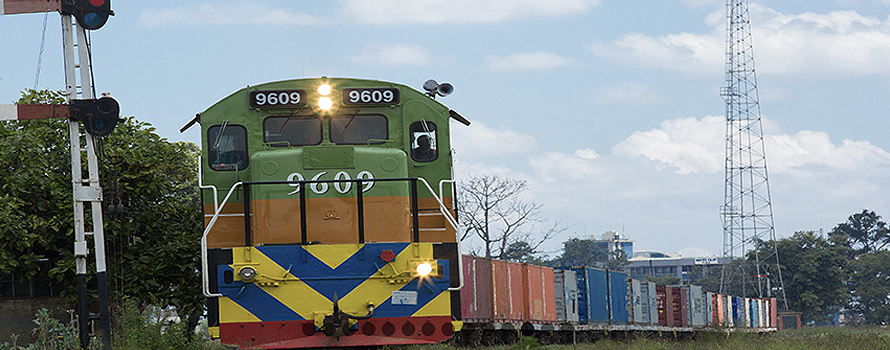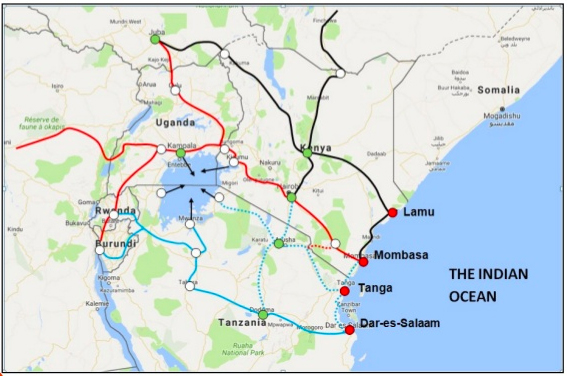Kenya has the first section of the new railway network financed with financial aid from Beijing.
Africa's participation in the New Silk Road promoted by China involves connecting the hinterland of several East African countries with the main ports on their Indian coast. The designed railway network , which introduces standard gauge in the region, has begun to operate between the two main cities of Kenya: Nairobi and the port of Mombasa. But the full realisation of the project is subject to the questionable model of Chinese investment.

▲Freight transport between Nairobi and Mombasa [Kenya Railways] ▲Freight transport between Nairobi and Mombasa [Kenya Railways].
article / Claudia Correa and Alexia Cosmello
Sino-African relations date back to the 15th century when Zhang, the navigator and trader, arrived on the shores of Mozambique. However, it was with Mao Zedong in 1949 that real relations were established. With promises of respect and taking into account the wounds left by colonisation, China has economically assisted Africa to become its main economic partner since 2009. Through the implementation of economic and technological cooperation projects, it has financed the construction of hydroelectric power plants, dams, airports, aqueducts, hospitals, refineries, gas pipelines, railways and highways in 52 of Africa's 54 countries.
Cooperation between China and Africa has grown considerably. Since 2000, ministerial conferences of the Forum on China-Africa Cooperation (FOCAC) have been held, increasing trade and partnership in areas such as Education, science, technology and health. On the other hand, in terms of lending and investment, China has announced that it will allocate a large part of its capital to projects on the African continent. In 2013, for example, Chinese President Xi Jinping pledged €14.4 billion for infrastructure built by Chinese companies, while in 2014 Premier Li Keqiang announced that China would allocate an additional €8.6 billion to development projects in Africa.
China's rise and intention to broaden and deepen its influence in the world has been very clear in recent years. In September 2013, Xi Jinping presented a new public works expansion project called the New Silk Road. With the goal to gain a foothold in world trade, China aims to improve Asia's connections with other regions by building land routes and articulating a sea route to facilitate trade. Although it is an initiative that will be useful for the international community, it is important to stress the benefits for Africa, since the East African transport route network will be built on its territory, which will give that part of the African continent greater access to world trade, as well as new infrastructure with cutting-edge technology.
Standard Gauge Railway
The network East African freight and passenger goal is intended to connect Kenya's major cities with Uganda's capital Kampala, Burundi's capital Bujumbura, South Sudan's capital Juba and Rwanda's capital Kigali. It is planned to apply standard gauge to most of the route, so the project is known as Standard Gauge Railway (SGR). It is estimated that the network railway will be around 2,935 kilometres in total and will cost around $13.8 billion. position The majority of the financing will be provided by the Chinese government, with financial aid and EiximBank, which will finance 90% of the construction costs, while the Kenyan government will finance the remaining 10% only. The work will be carried out by the Chinese business Road & Bridge Corporation, which is considered to be the most entrepreneurial public business presence in Africa.
The first phase of project, called the Madaraka Express, is now complete and was inaugurated in May 2017. The initiative involved the construction of a railway line to link Nairobi, the capital of Kenya, with Mombasa, the most important port city in Kenya and East Africa. The train can carry 1,260 passengers over a distance of approximately 470 km. With one of the key parts of the network transport network already built, it is possible to continue with the project and move on to the second phase, which will consist of extending the railway lines to the rest of the cities mentioned above.
|

project of the new railway network [Kenya Railways].
|
China's Investment Challenges
What are China's purposes for investing in Africa? It probably does so because it is a large potential market for the sale of its products, as well as a large source source of natural resources. In East Africa, for example, there is oil in Kenya or materials essential for mobile phone batteries in Malawi. In any case, it is clear that this is not a charitable act on the part of the Chinese, as it has been shown that Chinese banks and companies offer financing because it allows them to secure a larger market share in Africa as part of their strategy to go global.
According to Chinese Premier Li Keqiang, "cooperation with Africa is based on respect, equality and mutual benefit". African representatives are enthusiastic about China's investment in Africa's development . The Kenyan president declared that the new train will "revolutionise the region's Economics and reaffirm Kenya's status as an economic hub", and Malawi's ambassador Wang Shiting expressed his thoughts on Africa's development , posting that Africa will only improve when everyone contributes to its development, and that is precisely what China is currently doing.
According to agreement with these official views, from the African point of view, China's intervention on the continent is not seen as negative. However, it does present certain problems, such as the suspicion and accusation of corruption by Chinese investors or the claim that it is aggravatingly widening the economic gap between the more and less well-off, as Chinese investors understandably expect to do business with the continent's elites. There is also the mistreatment of the environment, such as the controversy over the environmental impact of the aforementioned network railway, especially in Kenya, where people have questioned the route through Nairobi Park because of the environmental impact.
It is not only Chinese companies that are investing on the African continent; some Western and European companies have, in some cases, replaced Chinese companies. A prime example is the US multinational General Electric, which in just one year has tripled its workforce in Nigeria, Kenya and Ethiopia. This is possible as a result of the delays or paralysis that some projects have suffered due to the sudden drop in raw material prices and the Chinese slowdown. Thanks to this, some African states with sufficient financial structure have taken the initiative themselves not to let the projects be buried.